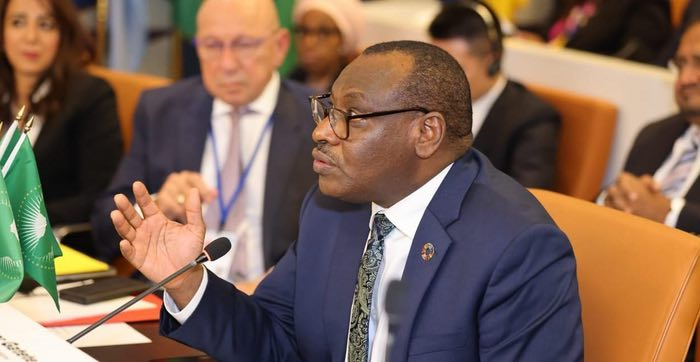
With African countries struggling under the weight of more than $1 trillion in debt and facing escalating climate costs, international cooperation must pivot toward empowering the continent’s own financial and trade systems, said Claver Gatete, executive secretary of the United Nations Economic Commission for Africa (ECA).
Speaking to Landry Signé, senior fellow at the Brookings Institution and host of the Foresight Africa podcast, during the IMF/World Bank Spring Meetings in Washington, D.C., Gatete outlined a vision for Africa that emphasizes domestic resource mobilization, regional value chains, and increased private sector participation.
“This time we are meeting at a very challenging moment,” Gatete said. “Debt levels have gone way beyond the normal. The same African countries are now facing a very difficult situation in terms of accessing concessional resources.”
Gatete, a former finance minister and central bank governor in Rwanda, noted that climate change is already costing African economies nearly 5% of GDP, a figure he expects to rise. Meanwhile, traditional aid is in decline, and existing financial instruments are proving insufficient.
To break the cycle of debt and dependence, Gatete said African nations must increase their tax-to-GDP ratios — currently averaging just 15.6% — by strengthening tax administration, digitizing economies, and plugging illicit financial leakages. “We all need to look internally and say: what do we need to do differently?” he said.
ECA is also working to deepen the implementation of the African Continental Free Trade Area (AfCFTA), not only to increase intra-African trade but also to ensure that exports are value-added rather than raw materials.
“We’re proposing 94 regional value chains — from minerals to agriculture and livestock — and we want the private sector to invest,” Gatete said. “But for them to come in, we must address issues of de-risking.”
He called for more effective use of global instruments, such as those offered by the International Finance Corporation, the World Bank’s International Development Association (IDA), and the Multilateral Investment Guarantee Agency (MIGA), to lower risk and attract long-term private capital to Africa.
Gatete moderated a panel at the Spring Meetings focused on debt restructuring, highlighting that today’s creditors include a growing number of non-Paris Club members and private lenders. “How do we bring them all into the room to discuss restructuring in a very complicated geopolitical environment?” he asked.
He also emphasized the importance of sharing knowledge across countries and regions, particularly in innovative financing mechanisms such as green bonds, blue bonds, and debt-for-climate swaps. “This is the place where we come together to exchange experience and propose real solutions,” Gatete said.
Signé praised Gatete’s vision and highlighted the critical importance of dialogue at events like the Spring Meetings, where ministers, financial institutions, think tanks, and civil society converge to shape the future of global cooperation.
Gatete agreed. “The key thing is how we develop our own capacity to generate our own resources and improve our credit ratings so we can attract investment beyond traditional aid,” he said.
